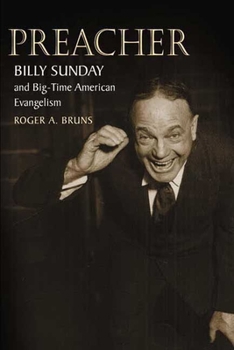Preacher: Billy Sunday and Big-Time American Evangelism
Select Format
Select Condition 
Book Overview
In this fast-paced, captivating account of Billy Sunday's life, Roger A. Bruns masterfully unfolds the story of modern evangelism. Born in Iowa during the Civil War, Sunday rose to fame as the "fastest man in baseball" during his career with the Chicago White Stockings in the 1880s. But he turned his back on the game when he heard the call of God, first spreading his old-fashioned, fundamentalist message in Chicago's gritty saloons.
By 1896, Sunday's swashbuckling campaign was on the road. He riled and rallied audiences across the country, firing off a slew of railing diatribes in his quest to expurgate the moral rot of society, board up bars and brothels, rid the world of cigarettes and dime novels, and save faithless, sinful, and rum-soaked souls from eternal damnation. In the tabernacles and tents of his traveling revival, Sunday served up a spectacle of rambunctious antics and quick-tongued invectives all grounded in his own moral and religious authority. He beseeched the "fal-da-rol" and "tommyrot" displayed by intellectuals, evolutionists, Unitarians, and left-wing radicals to build a massive religious dynasty that foreshadowed the successful careers of Jimmy Swaggart and Billy Graham. A stirring orator and consummate showman, Sunday's evangelical message reached millions of Americans, even before the advent of radio and television broadcasting. With unerring verve, Bruns chronicles how Sunday bridged the gap between the tent revivals of the nineteenth century and the evangelical empires of today.
By 1896, Sunday's swashbuckling campaign was on the road. He riled and rallied audiences across the country, firing off a slew of railing diatribes in his quest to expurgate the moral rot of society, board up bars and brothels, rid the world of cigarettes and dime novels, and save faithless, sinful, and rum-soaked souls from eternal damnation. In the tabernacles and tents of his traveling revival, Sunday served up a spectacle of rambunctious antics and quick-tongued invectives all grounded in his own moral and religious authority. He beseeched the "fal-da-rol" and "tommyrot" displayed by intellectuals, evolutionists, Unitarians, and left-wing radicals to build a massive religious dynasty that foreshadowed the successful careers of Jimmy Swaggart and Billy Graham. A stirring orator and consummate showman, Sunday's evangelical message reached millions of Americans, even before the advent of radio and television broadcasting. With unerring verve, Bruns chronicles how Sunday bridged the gap between the tent revivals of the nineteenth century and the evangelical empires of today.
Format:Paperback
Language:English
ISBN:0252070755
ISBN13:9780252070754
Release Date:February 2002
Publisher:University of Illinois Press
Length:360 Pages
Weight:1.14 lbs.
Dimensions:0.8" x 6.0" x 9.3"
Customer Reviews
1 rating
"Bughouse peddler of a second-hand gospel..."
Published by Thriftbooks.com User , 16 years ago
So a young Carl Sandburg described Billy Sunday, who biographer Bruns credits as the great grandfather of contemporary evangelicals such as Jimmy Swaggart, Jerry Falwell, Oral Roberts, Billy Graham, and the Bakkers (Sandburg quoted on p. 193; Sunday as forerunner, pp. 301-306). Sunday's bodily contortions, his fire-and-brimstone sermon style, and his out-of-control tongue--he advocated shooting all liberals, referred to nonfundamentalist Christians as hellhounds, was an enthusiastic supporter of WWI, proclaiming that he wished he could go to Europe and kill Germans, and waved the American flag (literally) while perched on his pulpit--earned him the "bughouse peddler" label. Sunday's story, in many ways, underscores that Christian fundamentalism today is very much like the fundamentalism Sunday preached. The same culture wars involving biblical literalism, evolution, liberal democracy, sexual mores, and country right-or-wrong conservatism were fought by Sunday--indeed, if Bruns is correct, some of them were practically invented by Sunday. Moreover, his organizational skills in his across-the-nation revival meetings set the stage for the incredibly sophisticated fundamentalist radio and television ministries today. In this regard, Sunday was a prophet. Unfortunately, however, as Bruns abundantly documents, Sunday was also a prophet for a close-minded, intolerant, and sometimes hate-mongering fundamentalism. He was a barely literate man who hated too widely and too fiercely, and he didn't hesitate to use the revivalist stage as a bully pulpit for thundering his dislikes. In many ways, according to Bruns, the slightly toxic legacy of Sunday is still with us. An excellent book, well-documented, well-written, and well-argued. Especially fascinating are Bruns' chapters (7 and 11, respectively) dealing with Sunday's obsessive war against alcohol (a war all the more poignant given that two of his sons because adult alcoholics) and his intense and vehement militarism. Bruns' depiction of Sunday is sure to raise the hackles of true believers. But it's an eminently accurate one.





